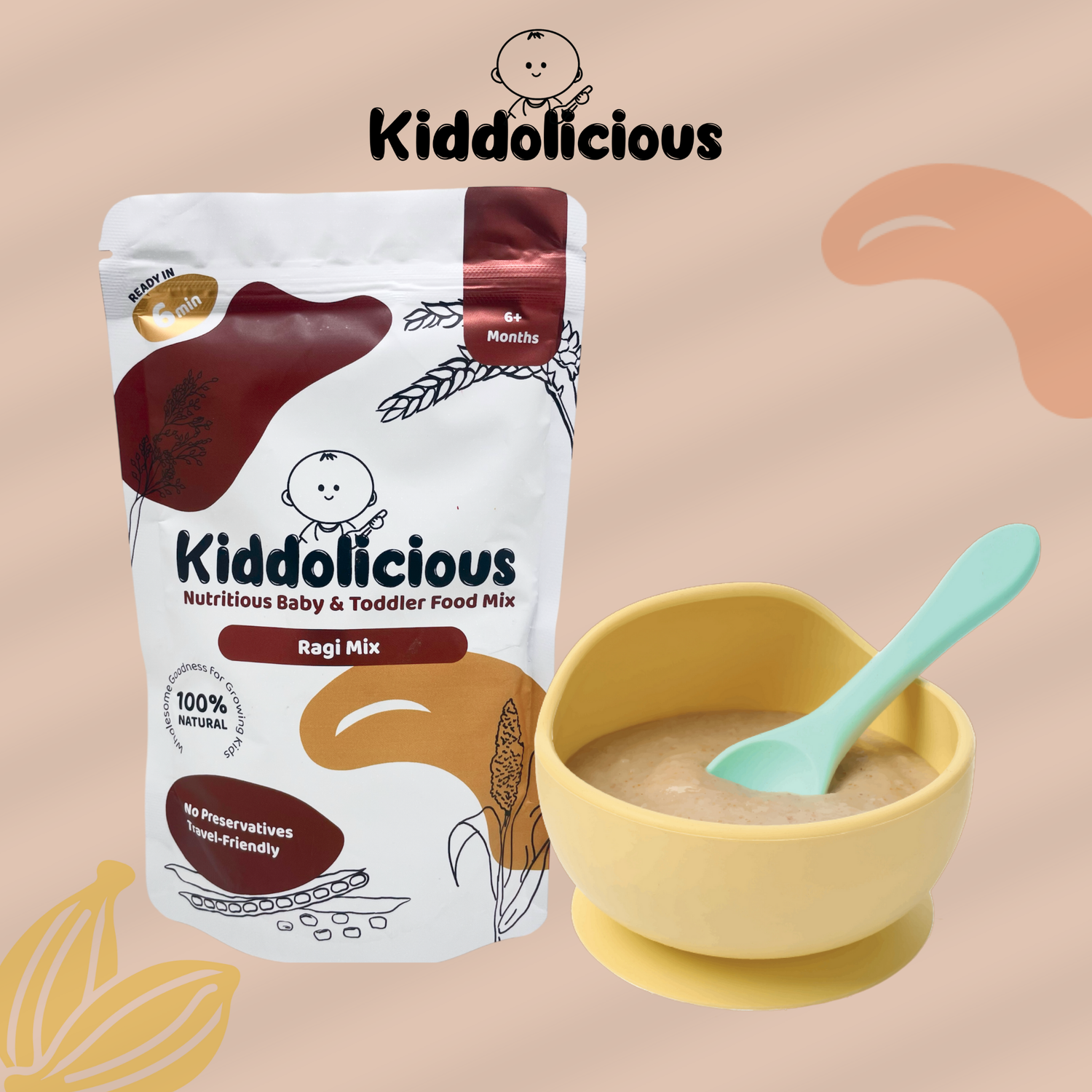
Benefits of Including Millets in Your Baby’s Diet
You often feel overwhelmed when finding the right food items for your baby’s balanced diet. Grains, especially, can be a confusing food item to decide on, as they vary in nutrient content, digestibility and impact on your little one’s growing, sensitive belly.
When your babies are between the ages of 6-23 months, you may start giving them starchy staples like rice and wheat, but they alone do not meet the essential nutrients and lack zinc, calcium, iron and vitamin B that are crucial for healthy growth.
This is where millets prove themselves to be the superfoods for nourishing the meal of your baby. These grains are so gentle on your child’s tummies and so nutrient-dense that they actually rival even the best modern baby cereal food.
This blog unpacks the nutritional benefits of millets in your baby’s diet and how you can include them for a daily spoonful of health.
What Millets Bring to the Table
- Gentle, prebiotic fiber that supports a healthy gut and prevents constipation.
- Powerful minerals like iron, calcium, and B vitamins, especially in ragi, which has nearly three times more calcium than wheat or rice.
- Balanced plant-based protein and slow-release energy to sustain growth and fullness, ideal for growing infants.
Benefits of Millets in Your Baby’s Diet
1. Gentle on Tiny Tummies
Millets have a soft, light texture that’s easy for developing digestive systems. They’re best introduced as slow‑cooked, mashed porridges or khichdis. Their prebiotic fiber helps regulate bowel movements and prevent constipation, common when babies switch to solids.
2. Full of Nutrients for Growth
Millets are more than filler. They offer a rich mix of iron, calcium, phosphorus, magnesium, and B vitamins essential for babies’ bone, brain, and muscle development.
Notably, finger millet (ragi) contains up to three times more calcium than milk, a strength-building block in early childhood.
3. Helps Prevent Anaemia & Builds Immunity
Iron deficiency is common in infants. Millets such as ragi and pearl millet help boost iron levels, supporting healthy hemoglobin and cognitive development.
Millets also contain antioxidants like phenolic acids and flavonoids, which support immune health.
4. Keeps Energy Steady & Promotes Healthy Weight
Millets are slow‑digesting carbohydrates that release energy gradually. This keeps your baby fuller, happier, and less likely to experience energy crashes.
For babies who are slow gainers or need gentle weight support, mixing millets with healthy fats like ghee or yogurt provides nutrient-rich fuel for growth.
5. Supports Bone & Muscle Development
Finger millet is renowned for its protein and calcium, perfect for growing bones. Other millets like foxtail and pearl provide protein, phosphorus, and magnesium that support muscle recovery and healthy development.
6. Cultivates Gut Health Early
Millets are naturally rich in fiber that acts as prebiotics—foods that feed good gut bacteria. A healthy gut is key to proper digestion and stronger immunity in babies.
7. Versatile, Tasty Meals for Babies
Millets adapt beautifully to baby-friendly meals:
- Ragi Porridge: Smooth, nutrient-dense and comforting.
- Foxtail Millet Khichdi: Mixed with moong dal and veggies for balanced nutrition.
- Little Millet Upma or Barnyard Porridge: Mild flavours and easy texture.
As the baby grows, try millet pancakes or mashed idli for variety.
8. Ideal for Weaning: Start Slow, Watch Carefully
Introduce millets one variety at a time: start with 1–2 teaspoons of cooked millet porridge once a day. Wait three days before introducing a new food to track reactions.
Babies with sensitive tummies or thyroid issues may need mindful intake, proper soaking and cooking, and occasional breaks to avoid rare side effects like gas or goitrogen concerns.
WHO guidelines emphasize that when cereal grains are used for baby food, whole grains must be prioritized over refined ones to meet the nutrient needs.
Millets are not just any passing trend; they are deeply rooted in our culinary culture as part of Indian childcare and are here to stay to deliver a nutrient-packed meal for your baby, all in a gluten-free, easy-to-digest form
At Kiddolicious, we encourage introducing millets gradually and thoughtfully in your baby’s meal, while also consulting a healthcare professional to wisely nurture their growth.
Conclusion:
Choosing the right nutrition for your baby is one of the most important steps in their growth journey. At Kiddolicious, we make that choice easy and wholesome with our range of all-natural porridge mixes made from Jowar, Ragi, Bajra, and Whole Wheat—specially crafted for babies aged 6 months and above. With no added salt, no added sugar, and zero preservatives, our porridges are gentle on tiny tummies and packed with essential nutrients to support healthy development.
Explore our nutritious porridge range and give your little one a healthy start—because every spoonful should be as pure and delicious as your love.
👉 Shop now and make mealtime both nourishing and delightful!
